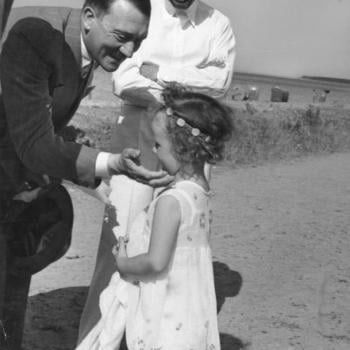Toxic Religion
Last evening my wife and I watched Dateline (May 1, 2020)—an American “news magazine” television program that usually focuses on crimes with mysteries attached to them. “Whodonit?” If there’s an answer, it’s usually “the husband” or “the boyfriend.” (For me, after a while, the similarity between all these American TV crime shows gets boring. If I say “the husband” or “the boyfriend” at the beginning of the program I’m almost always right about who turns out to be the murderer.) So I have mostly stopped watching them. (I’m old enough to remember when most of them focused on a variety of issues and not only murder mysteries.)
Twice now Dateline has focused on a very astonishing mystery. Last evening’s episode was entitled “Where Are the Children?” What especially intrigues me about this developing story (and it is all over Youtube so you can find bits and pieces of it there if you’re interested) is the role of religion in it. Expressed very briefly, a family became caught up in a podcast-based religious belief system about the end of the world as we know it. Most of them started out members of the Church of Jesus Christ of Latter Day Saints, but the key “players” in the mystery wandered away from that into something else. Their focus came to be on the catastrophic end of the world and then on demonic entities inhabiting people and needing to be cast out. Several murders ensued, but how they are related to the religion is unclear. Most investigators seem to think there is some connection. At the heart of the mystery is the disappearance of two children. There are people who should know where the children are, but they are not saying—much to the frustration and sorrow of law enforcement and relatives of the children.
Again, as often before, the question I face as a scholar of religion in America (especially) is what causes some people to join religious movements that become extremely toxic.
Now, let me say for legal reasons that I have no special knowledge about this new religious movement and do not know for a fact that it is toxic; I am only supposing it is—until and unless contrary evidence comes to light—because that is the clear conclusion of some investigative journalists and people close to some of the members and leaders. It does not seem to have one definite name and has no direct connection with Mormonism or the LDS Church.
*Sidebar: The opinions expressed here are my own (or those of the guest writer); I do not speak for any other person, group or organization; nor do I imply that the opinions expressed here reflect those of any other person, group or organization unless I say so specifically. Before commenting read the entire post and the “Note to commenters” at its end.*
If there is one thing religion scholars, people whose scholarly credentials include studying religion, should do it is attempt to explain “toxic religion”—religion that inclines toward harming people. By “harming people” I do NOT mean merely teaching wrong beliefs; I mean leading people to become involved in suicides, murders, physical and emotional abuse, coercion, etc. There does seem to be a side of religion that, combined with certain personalities and circumstances (often together) seduces people into bizarre and harmful beliefs and practices—where certain individuals are somehow encouraged to commit suicide, murder, physical and/or emotional abuse, and coercion.
As a scholar of religious studies with a Ph.D. in Religious Studies from a major research university I will dare to say that not all religion is toxic. Religion can and often does play a very useful and even helpful role in people’s lives. So, I will not post comments here that claim all religion is toxic. Don’t bother.
The question I wrestle with is this: How can I/we detect when religion becomes toxic? And what should religious influencers do about it when a religious movement or group steps over that line?
One clear sign of toxic religion is radical change in a person’s or persons’ personalities such that they take on beliefs and behaviors that are obsessively fearful and/or hateful.
Good religion promotes healthy human life—even if that includes false beliefs. What is “healthy human life?” It is life that promotes well-being of self and others.
So what should religious influencers do when they notice a group of religious people moving toward and into toxic religion?
Apparently this particular group reported on by Dateline and others attended LDS congregations. They established a center (maybe centers—plural) in places where Mormonism is strong. Might the bishops there have recognized something amiss? I don’t know. But if they did, they should have sounded the alarm to their own people and up the chain to LDS leaders.
Let’s take a look back at some other instances of toxic religion that stayed “under the radar” far too long. The People’s Temple led by Jim Jones was somehow related to a mainline Protestant denomination. The Branch Davidians were expelled by a large Protestant sect.
Now, of course, there are cases where an individual or small group simply starts something out of nothing, that is, out of their own imagination and resources with no connection to any existing religious group. Even then, however, there are usually people who “see” something developing that is toxic and could sound the alarm to others. This rarely happens or if it does it usually does not result in any action.
Having studied this particular group, the one now being reported on because of the inexplicably missing children, I have to wonder why some people who knew about the apparent toxicity of the group’s teachings did not act to sound the alarm. If they did, that’s not being reported, except that they did too late.
So what do we need? In America, and probably in every country, there needs to be a panel of religion scholars of various religious faiths (and possibly none) who meet frequently and who keep “tabs” on developing new religious movements and groups and who sound the alarm of toxicity—when they move close to or step across the line into promoting extreme fear and/or hate that could result in serious harm to persons.
*Note to commenters: This blog is not a discussion board; please respond with a question or comment only to me. If you do not share my evangelical Christian perspective (very broadly defined), feel free to ask a question for clarification, but know that this is not a space for debating incommensurate perspectives/worldviews. In any case, know that there is no guarantee that your question or comment will be posted by the moderator or answered by the writer. If you hope for your question or comment to appear here and be answered or responded to, make sure it is civil, respectful, and “on topic.” Do not comment if you have not read the entire post and do not misrepresent what it says. Keep any comment (including questions) to minimal length; do not post essays, sermons or testimonies here. Do not post links to internet sites here. This is a space for expressions of the blogger’s (or guest writers’) opinions and constructive dialogue among evangelical Christians (very broadly defined).
















